外研(新标准)版八年级上册Module 1 How to learn English Unit 3 Language in use 课件(共30张PPT)
文档属性
| 名称 | 外研(新标准)版八年级上册Module 1 How to learn English Unit 3 Language in use 课件(共30张PPT) | 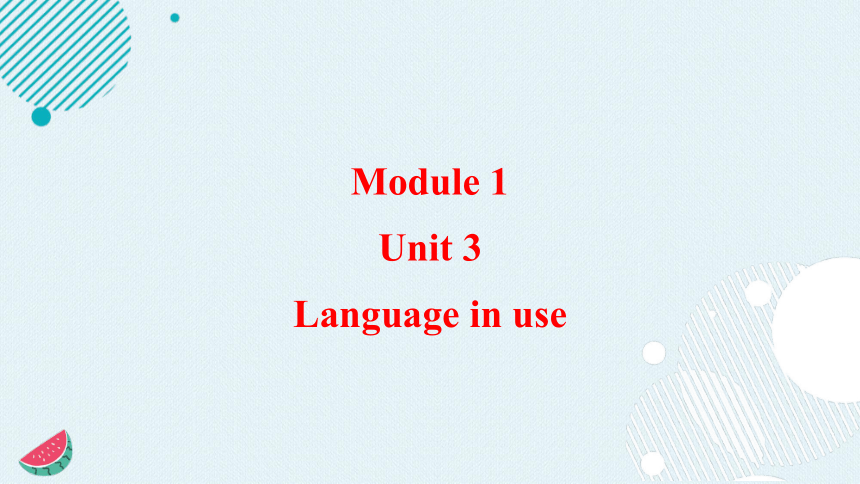 | |
| 格式 | pptx | ||
| 文件大小 | 19.5MB | ||
| 资源类型 | 教案 | ||
| 版本资源 | 外研版 | ||
| 科目 | 英语 | ||
| 更新时间 | 2024-08-05 22:31:21 | ||
图片预览


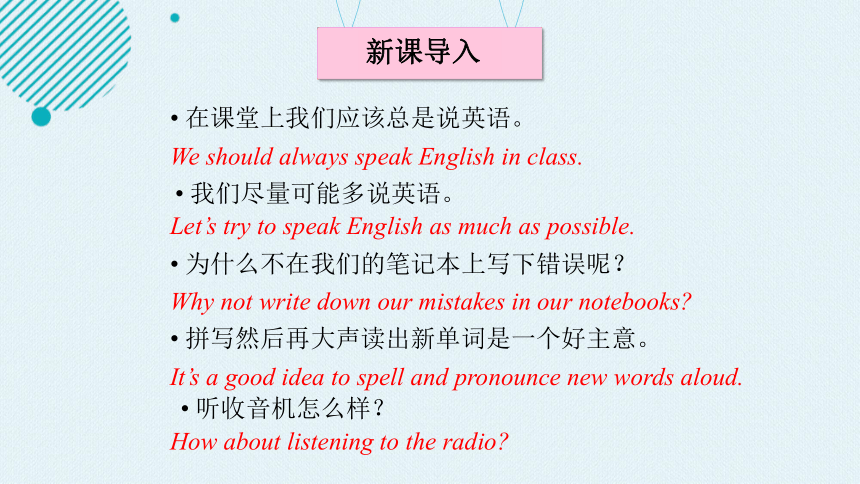
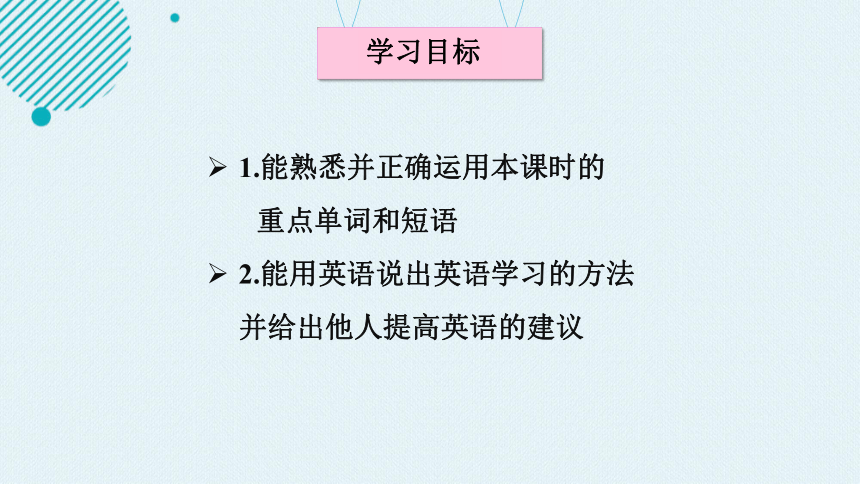
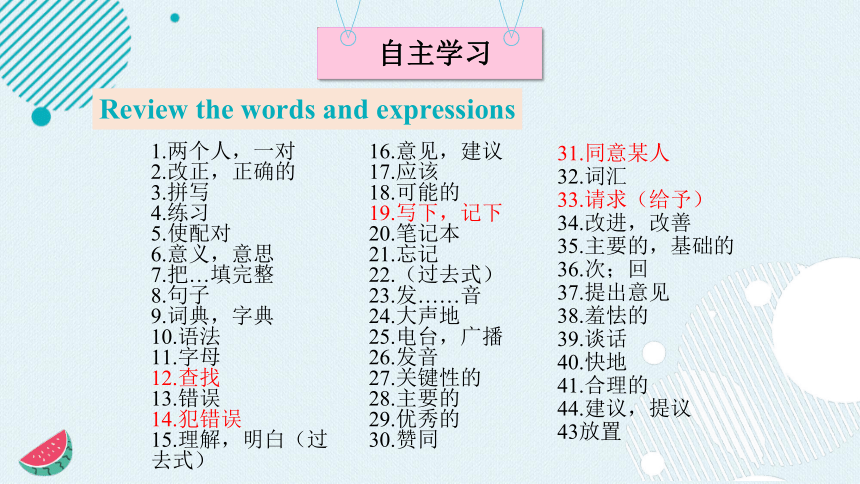

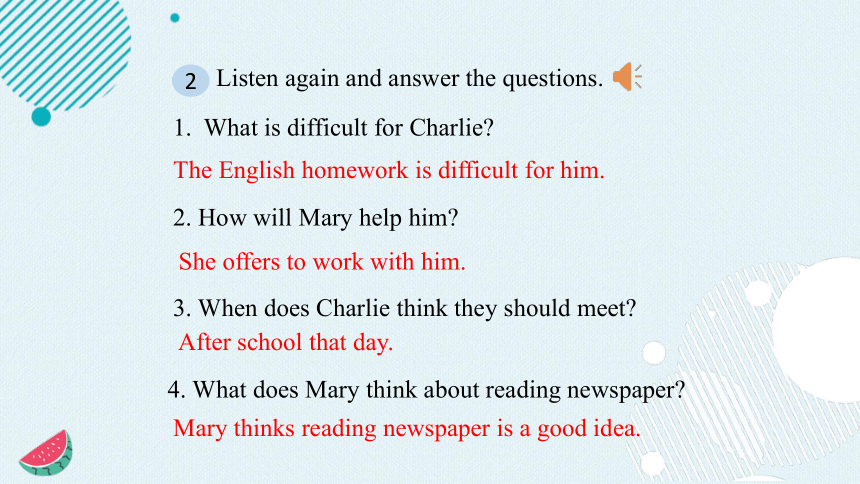

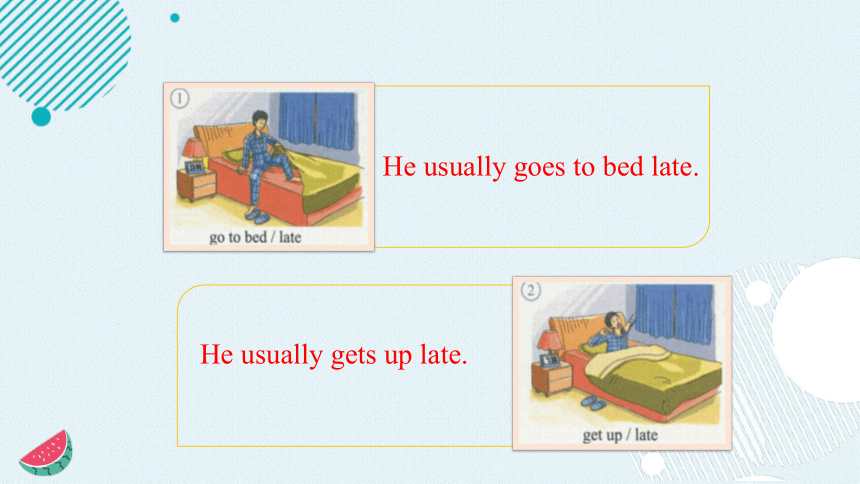
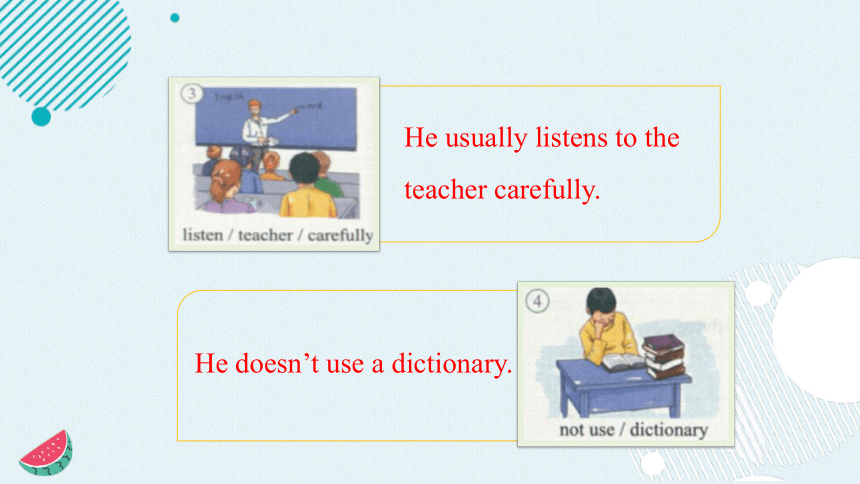
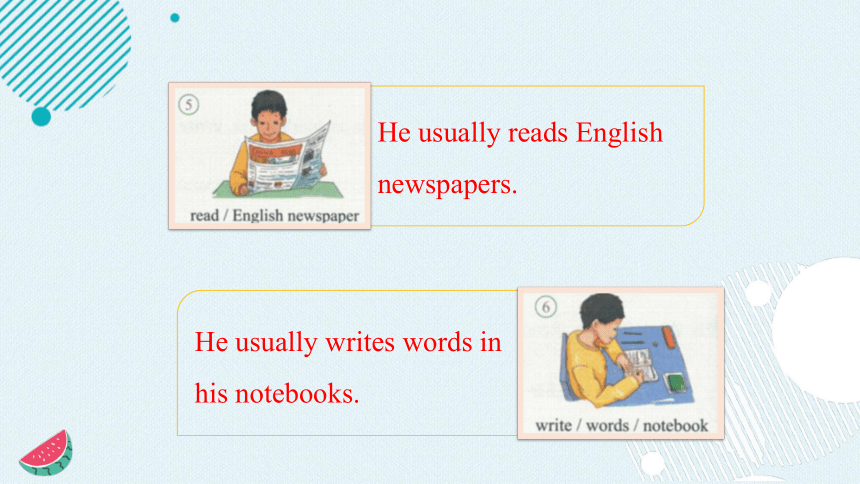
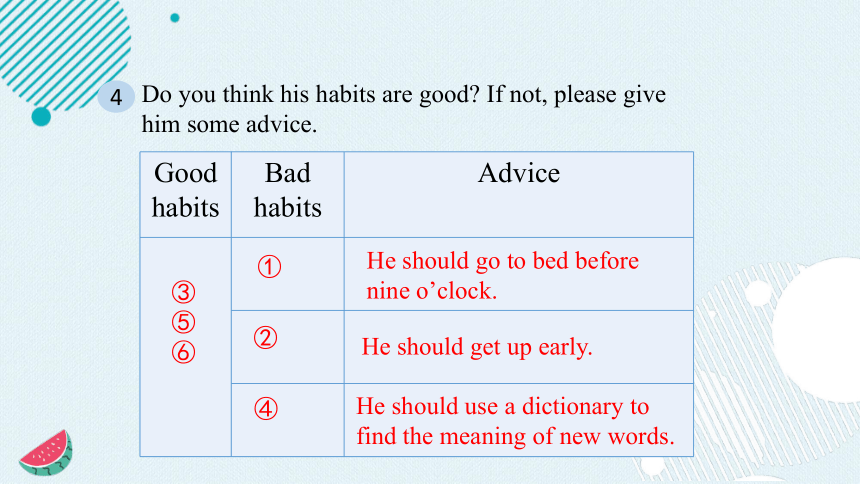
文档简介
(共30张PPT)
Module 1
Unit 3
Language in use
学习目标
重点探究
自主学习
学习导航
当堂检测
课堂总结
拓展提升
新课导入
在课堂上我们应该总是说英语。
我们尽量可能多说英语。
为什么不在我们的笔记本上写下错误呢?
拼写然后再大声读出新单词是一个好主意。
听收音机怎么样?
We should always speak English in class.
Let’s try to speak English as much as possible.
Why not write down our mistakes in our notebooks
It’s a good idea to spell and pronounce new words aloud.
How about listening to the radio
学习目标
1.能熟悉并正确运用本课时的
重点单词和短语
2.能用英语说出英语学习的方法并给出他人提高英语的建议
自主学习
Review the words and expressions
1.两个人,一对
2.改正,正确的
3.拼写
4.练习
5.使配对
6.意义,意思
7.把…填完整
8.句子
9.词典,字典
10.语法
11.字母
12.查找
13.错误
14.犯错误
15.理解,明白(过去式)
31.同意某人
32.词汇
33.请求(给予)
34.改进,改善
35.主要的,基础的
36.次;回
37.提出意见
38.羞怯的
39.谈话
40.快地
41.合理的
44.建议,提议
43放置
16.意见,建议
17.应该
18.可能的
19.写下,记下
20.笔记本
21.忘记
22.(过去式)
23.发……音
24.大声地
25.电台,广播
26.发音
27.关键性的
28.主要的
29.优秀的
30.赞同
重点探究
Listen and check( ) the expressions of advice you hear.
√
1 Why don’t we …
2 How about …
3 We should …
4 We can …
5 Let’s try to …
6 Can you …
7 Remember to …
√
√
√
√
√
√
√
1
Listen again and answer the questions.
What is difficult for Charlie
2. How will Mary help him
3. When does Charlie think they should meet
The English homework is difficult for him.
She offers to work with him.
After school that day.
4. What does Mary think about reading newspaper
Mary thinks reading newspaper is a good idea.
2
Look at the pictures and say what Jack usually does.
3
He usually goes to bed late.
He usually gets up late.
He usually listens to the teacher carefully.
He doesn’t use a dictionary.
He usually reads English newspapers.
He usually writes words in his notebooks.
Do you think his habits are good If not, please give him some advice.
Good habits Bad habits Advice
He should go to bed before nine o’clock.
He should use a dictionary to find the meaning of new words.
③
⑤
⑥
①
②
④
He should get up early.
4
Read Helen’s question and complete Diana’s answer with
the correct form of the word and expressions in the box.
FROM: Helen
TO: Diana
SUBJECT: How to improve speaking
Hi, Diana,
I like English very much. My reading is good, but my speaking is poor. How can I improve my speaking
Best,
Helen
how about should try to why don’t why not
5
FROM: Diana
TO: Helen
SUBJECT: How to improve speaking
Hello, Helen,
You need to practice speaking more often. It’s good for your vocabulary. Then (1) _________ you look for some people who speak English in your town (2) _________ saying hello to them and asking them where they come from
why don’t
How about
(3) _______ make friends and show them around your town. Is there an English club in your town If there isn’t, (4) __________ start one with your friends (5) __________ playing a few games and listening to some music
You can watch English films together, and (6) ___________ speak English all the time. Then you (7) ______ invite your new English friends to your club!
Best,
Diana
Try to
why not
How about
try to
should
Work in pairs. Read the problems of Student A and Student B. Take turns to give advice. Use the expressions in the box to help you.
ask your teacher read aloud talk to your classmates
use a dictionary
Student A Student B
I like listening to English songs, but there are too many new words. I can’t speak English well.
I want to read an English book, but I can’t choose the right one. It’s difficult to remember new words.
6
Now write down your advice
Student A’s Problems Suggestions
I like listening to English songs, but there are too many new words.
I want to read an English book, but I can’t choose the right one.
How about using a dictionary to find the meaning of new words
Why don’t you ask your teacher to choose an English book for you
Student B’s Problems Suggestions
I can’t speak English well.
It’s difficult to remember new words.
Why not practise talking
to your classmates
You can read new words aloud.
Complete the conversation with the words in the box.
advice check forget improve possible
Helen: How can I (1) __________ my reading
James: Here is my (2) ________. Choose a newspaper to read. First, think about what’s happening today. What will be in the newspaper Then read the titles of articles and choose one to read for more information. Don’t stop to (3) _________ every word. You don’t need to know every word to understand the article. Learning only a few words is enough. Try to use them as much as (4) ________. Then you won’t (5) _________ them easily.
improve
advice
check
possible
forget
7
Around the world
English online
In addition to English magazines,
newspapers and radio, there are various
kinds of English learning websites.
Millions of people around the world
visit them daily to improve their English.
If someone from Spain asks a question, they may get an answer from Canada instantly. On the Internet,you can chat with other English speakers freely, and enjoy the latest English songs.
The Internet brings the world of English to you.
Write down what you are not good at in English.
Step 1:
Module task—Making your English study plan
What I am not good at
________________________________________________________________________________________________
What I should do
____________________________________________________________________________________________
Make an English plan for this year. Use the
information in Step 1 to help you.
Step 2:
Step 3:
Work in pairs and discuss your study plan.
Think about your partner’s advice and revise your English study plan.
Step 4:
拓展提升
表示现在经常性、习惯性发生的动作或状态。
表示主语具备的性格和能力。
I ride my bike to school every day.
表示客观真理或自然规律。
He can speak five foreign languages.
The sun rises in the east.
在条件状语从句和时间状语从句中,常用一般现在时表示将来时。
I’ll call you when I come back tomorrow.
一般现在时的用法
Revision — Grammar
一般过去时
表示过去某个时间发生的事、存在的状态或过去反复发生的动作。常用的时间状语有yesterday,yesterday morning/ afternoon /evening,last week,in 1980等。
例如:It snowed heavily last night.
It was very cold yesterday.
一般将来时
表示将来某个时间要发生的动作或存在的状态。
I will go back to my hometown next week.
表示计划、打算、决定要做某事。
We’re going to talk about good ways to learn English.
用法1
用法2
2.表示当前一段时间内的活动或现阶段正在进行的活动。
1.表示现在正在进行或发生的动作。
Look! She is swimming in the river!
现在进行时
Are you learning English this year
How can I …
What should I do
Can you give me some advice
What do you think I should do
advice
征求意见
It’s a good idea to do….
You should/shouldn’t do ….
What about/How about …
Why don’t you/Why not do…
Try (not) to do….
Don’t forget/Remember to do....
提供建议
如何征求意见和提供建议?
当堂检测
Ⅰ.用所给词的适当形式填空。
1. Do you know the__________(mean)of the new word
2. We are so tired. Let’s stop__________(have)a rest.
3. Do you know how I can improve my__________(speak)
4. Li Ming is always the first student__________(get)to school.
5. We can’t hear clearly. Can you speak as__________(loudly)as possible
meaning
to have
speaking
to get
loudly
当堂检测
II.句型转换。
1. Why don’t you visit some English sites on the Internet (改为同义句)
__________ __________visiting some English sites on the Internet
2. I’d like to listen to English songs.(对画线部分提问)
________would you like________ ________
3. I want to buy the red skirt.(对画线部分提问)
__________ __________do you want to buy
4. Try to look up every word in the dictionary.(改为否定句)
Try_________ __________ __________up every word in the dictionary.
5. I showed my foreign friends around our town.(改为同义句)
I __________my foreign friends __________our town.
What/How about
What to do
Which skirt
not to look
took around
课堂总结
Module 1
Unit 3
提建议的句型
时态:
一般现在时,一般过去时,一般将来时
Module 1
Unit 3
Language in use
学习目标
重点探究
自主学习
学习导航
当堂检测
课堂总结
拓展提升
新课导入
在课堂上我们应该总是说英语。
我们尽量可能多说英语。
为什么不在我们的笔记本上写下错误呢?
拼写然后再大声读出新单词是一个好主意。
听收音机怎么样?
We should always speak English in class.
Let’s try to speak English as much as possible.
Why not write down our mistakes in our notebooks
It’s a good idea to spell and pronounce new words aloud.
How about listening to the radio
学习目标
1.能熟悉并正确运用本课时的
重点单词和短语
2.能用英语说出英语学习的方法并给出他人提高英语的建议
自主学习
Review the words and expressions
1.两个人,一对
2.改正,正确的
3.拼写
4.练习
5.使配对
6.意义,意思
7.把…填完整
8.句子
9.词典,字典
10.语法
11.字母
12.查找
13.错误
14.犯错误
15.理解,明白(过去式)
31.同意某人
32.词汇
33.请求(给予)
34.改进,改善
35.主要的,基础的
36.次;回
37.提出意见
38.羞怯的
39.谈话
40.快地
41.合理的
44.建议,提议
43放置
16.意见,建议
17.应该
18.可能的
19.写下,记下
20.笔记本
21.忘记
22.(过去式)
23.发……音
24.大声地
25.电台,广播
26.发音
27.关键性的
28.主要的
29.优秀的
30.赞同
重点探究
Listen and check( ) the expressions of advice you hear.
√
1 Why don’t we …
2 How about …
3 We should …
4 We can …
5 Let’s try to …
6 Can you …
7 Remember to …
√
√
√
√
√
√
√
1
Listen again and answer the questions.
What is difficult for Charlie
2. How will Mary help him
3. When does Charlie think they should meet
The English homework is difficult for him.
She offers to work with him.
After school that day.
4. What does Mary think about reading newspaper
Mary thinks reading newspaper is a good idea.
2
Look at the pictures and say what Jack usually does.
3
He usually goes to bed late.
He usually gets up late.
He usually listens to the teacher carefully.
He doesn’t use a dictionary.
He usually reads English newspapers.
He usually writes words in his notebooks.
Do you think his habits are good If not, please give him some advice.
Good habits Bad habits Advice
He should go to bed before nine o’clock.
He should use a dictionary to find the meaning of new words.
③
⑤
⑥
①
②
④
He should get up early.
4
Read Helen’s question and complete Diana’s answer with
the correct form of the word and expressions in the box.
FROM: Helen
TO: Diana
SUBJECT: How to improve speaking
Hi, Diana,
I like English very much. My reading is good, but my speaking is poor. How can I improve my speaking
Best,
Helen
how about should try to why don’t why not
5
FROM: Diana
TO: Helen
SUBJECT: How to improve speaking
Hello, Helen,
You need to practice speaking more often. It’s good for your vocabulary. Then (1) _________ you look for some people who speak English in your town (2) _________ saying hello to them and asking them where they come from
why don’t
How about
(3) _______ make friends and show them around your town. Is there an English club in your town If there isn’t, (4) __________ start one with your friends (5) __________ playing a few games and listening to some music
You can watch English films together, and (6) ___________ speak English all the time. Then you (7) ______ invite your new English friends to your club!
Best,
Diana
Try to
why not
How about
try to
should
Work in pairs. Read the problems of Student A and Student B. Take turns to give advice. Use the expressions in the box to help you.
ask your teacher read aloud talk to your classmates
use a dictionary
Student A Student B
I like listening to English songs, but there are too many new words. I can’t speak English well.
I want to read an English book, but I can’t choose the right one. It’s difficult to remember new words.
6
Now write down your advice
Student A’s Problems Suggestions
I like listening to English songs, but there are too many new words.
I want to read an English book, but I can’t choose the right one.
How about using a dictionary to find the meaning of new words
Why don’t you ask your teacher to choose an English book for you
Student B’s Problems Suggestions
I can’t speak English well.
It’s difficult to remember new words.
Why not practise talking
to your classmates
You can read new words aloud.
Complete the conversation with the words in the box.
advice check forget improve possible
Helen: How can I (1) __________ my reading
James: Here is my (2) ________. Choose a newspaper to read. First, think about what’s happening today. What will be in the newspaper Then read the titles of articles and choose one to read for more information. Don’t stop to (3) _________ every word. You don’t need to know every word to understand the article. Learning only a few words is enough. Try to use them as much as (4) ________. Then you won’t (5) _________ them easily.
improve
advice
check
possible
forget
7
Around the world
English online
In addition to English magazines,
newspapers and radio, there are various
kinds of English learning websites.
Millions of people around the world
visit them daily to improve their English.
If someone from Spain asks a question, they may get an answer from Canada instantly. On the Internet,you can chat with other English speakers freely, and enjoy the latest English songs.
The Internet brings the world of English to you.
Write down what you are not good at in English.
Step 1:
Module task—Making your English study plan
What I am not good at
________________________________________________________________________________________________
What I should do
____________________________________________________________________________________________
Make an English plan for this year. Use the
information in Step 1 to help you.
Step 2:
Step 3:
Work in pairs and discuss your study plan.
Think about your partner’s advice and revise your English study plan.
Step 4:
拓展提升
表示现在经常性、习惯性发生的动作或状态。
表示主语具备的性格和能力。
I ride my bike to school every day.
表示客观真理或自然规律。
He can speak five foreign languages.
The sun rises in the east.
在条件状语从句和时间状语从句中,常用一般现在时表示将来时。
I’ll call you when I come back tomorrow.
一般现在时的用法
Revision — Grammar
一般过去时
表示过去某个时间发生的事、存在的状态或过去反复发生的动作。常用的时间状语有yesterday,yesterday morning/ afternoon /evening,last week,in 1980等。
例如:It snowed heavily last night.
It was very cold yesterday.
一般将来时
表示将来某个时间要发生的动作或存在的状态。
I will go back to my hometown next week.
表示计划、打算、决定要做某事。
We’re going to talk about good ways to learn English.
用法1
用法2
2.表示当前一段时间内的活动或现阶段正在进行的活动。
1.表示现在正在进行或发生的动作。
Look! She is swimming in the river!
现在进行时
Are you learning English this year
How can I …
What should I do
Can you give me some advice
What do you think I should do
advice
征求意见
It’s a good idea to do….
You should/shouldn’t do ….
What about/How about …
Why don’t you/Why not do…
Try (not) to do….
Don’t forget/Remember to do....
提供建议
如何征求意见和提供建议?
当堂检测
Ⅰ.用所给词的适当形式填空。
1. Do you know the__________(mean)of the new word
2. We are so tired. Let’s stop__________(have)a rest.
3. Do you know how I can improve my__________(speak)
4. Li Ming is always the first student__________(get)to school.
5. We can’t hear clearly. Can you speak as__________(loudly)as possible
meaning
to have
speaking
to get
loudly
当堂检测
II.句型转换。
1. Why don’t you visit some English sites on the Internet (改为同义句)
__________ __________visiting some English sites on the Internet
2. I’d like to listen to English songs.(对画线部分提问)
________would you like________ ________
3. I want to buy the red skirt.(对画线部分提问)
__________ __________do you want to buy
4. Try to look up every word in the dictionary.(改为否定句)
Try_________ __________ __________up every word in the dictionary.
5. I showed my foreign friends around our town.(改为同义句)
I __________my foreign friends __________our town.
What/How about
What to do
Which skirt
not to look
took around
课堂总结
Module 1
Unit 3
提建议的句型
时态:
一般现在时,一般过去时,一般将来时
同课章节目录
- Module 1 How to learn English
- Unit 1 Let's try to speak English as much as possi
- Unit 2 You should smile at her.
- Unit 3 Language in use .
- Module 2 My home town and my country
- Unit 1 It's taller than many other buildings.
- Unit 2 Cambridge is a beautiful city in the east o
- Unit 3 Language in use .
- Module 3 Sports.
- Unit 1 Nothing is more exciting than playing tenni
- Unit 2 This year we training more carefully.
- Unit 3 Language in use .
- Module 4 Planes, ships and trains .
- Unit 1 He lives the farthest from school.
- Unit 2 What is the best way to travel.
- Unit 3 Language in use .
- Module 5 Lao She Teahouse.
- Unit 1 I wanted to see the Beijing Opera.
- Unit 2 It descibes the changes in Chinese society.
- Unit 3 Language in use .
- Module 6 Animals in danger.
- Unit 1 It allows people to get closer to them .
- Unit 2 The WWF is working hard to save them all.
- Unit 3 Language in use .
- Revision module A
- Module 7 A famous story
- Unit 1 Alice was sitting with her sister by the ri
- Unit 2 She was thinking about her cat.
- Unit 3 Language in use .
- Module 8 Accidents
- Unit 1 While the car were changing to red, a car s
- Unit 2 I was trying to pick it up when it bite me
- Unit 3 Language in use .
- Module 9 Population
- Unit 1 The population of China is about 1.37 billi
- Unit 2 Arnwick was a city with 200,000 people.
- Unit 3 Language in use .
- Module 10 The weathe
- Unit 1 It might snow.
- Unit 2 The weather is fine all year round.
- Unit 3 Language in use .
- Module 11 Way of life
- Unit 1 In China ,we open a gift later.
- Unit 2 In England, you usually drink tea with milk
- Unit 3 Language in use .
- Module 12 Help
- Unit 1 What should we do before help arrives?
- Unit 2 Stay away from windows and heavy furniture.
- Unit 3 Language in use .
- Revision module B
